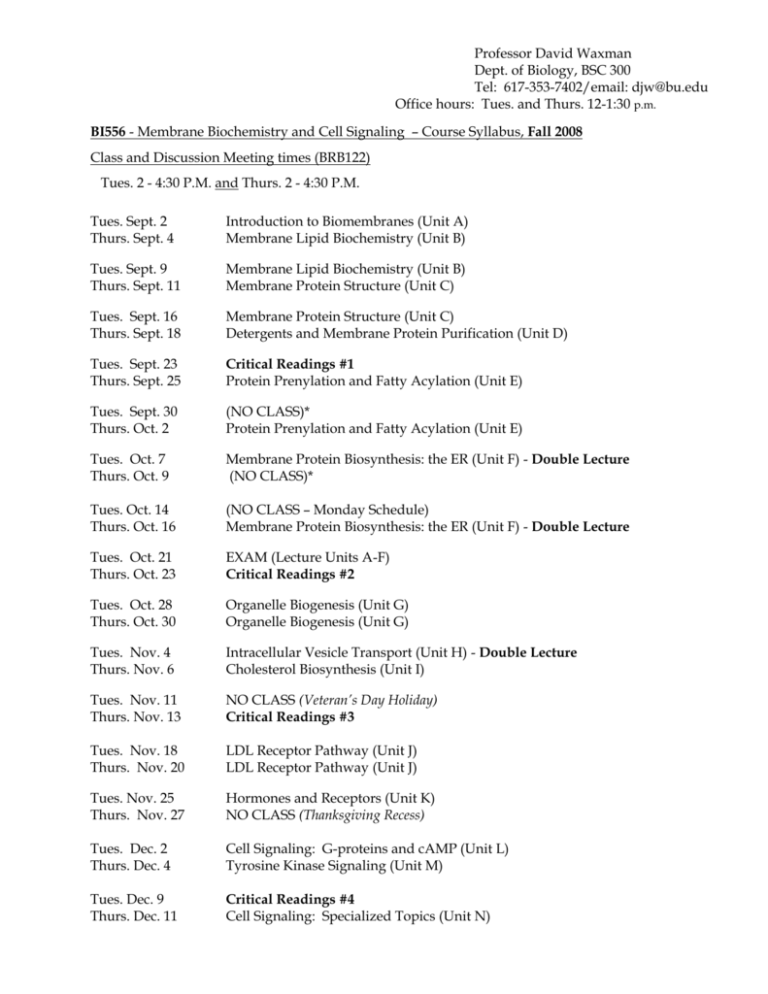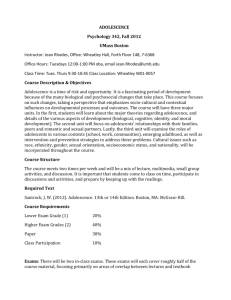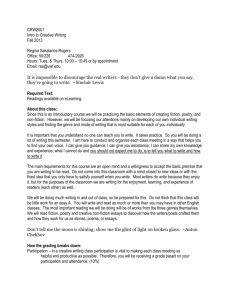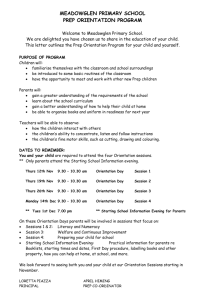Professor David Waxman Dept. of Biology, BSC 300 Tel: 617
advertisement

Professor David Waxman Dept. of Biology, BSC 300 Tel: 617-353-7402/email: djw@bu.edu Office hours: Tues. and Thurs. 12-1:30 p.m. BI556 - Membrane Biochemistry and Cell Signaling – Course Syllabus, Fall 2008 Class and Discussion Meeting times (BRB122) Tues. 2 - 4:30 P.M. and Thurs. 2 - 4:30 P.M. Tues. Sept. 2 Thurs. Sept. 4 Introduction to Biomembranes (Unit A) Membrane Lipid Biochemistry (Unit B) Tues. Sept. 9 Thurs. Sept. 11 Membrane Lipid Biochemistry (Unit B) Membrane Protein Structure (Unit C) Tues. Sept. 16 Thurs. Sept. 18 Membrane Protein Structure (Unit C) Detergents and Membrane Protein Purification (Unit D) Tues. Sept. 23 Thurs. Sept. 25 Critical Readings #1 Protein Prenylation and Fatty Acylation (Unit E) Tues. Sept. 30 Thurs. Oct. 2 (NO CLASS)* Protein Prenylation and Fatty Acylation (Unit E) Tues. Oct. 7 Thurs. Oct. 9 Membrane Protein Biosynthesis: the ER (Unit F) - Double Lecture (NO CLASS)* Tues. Oct. 14 Thurs. Oct. 16 (NO CLASS – Monday Schedule) Membrane Protein Biosynthesis: the ER (Unit F) - Double Lecture Tues. Oct. 21 Thurs. Oct. 23 EXAM (Lecture Units A-F) Critical Readings #2 Tues. Oct. 28 Thurs. Oct. 30 Organelle Biogenesis (Unit G) Organelle Biogenesis (Unit G) Tues. Nov. 4 Thurs. Nov. 6 Intracellular Vesicle Transport (Unit H) - Double Lecture Cholesterol Biosynthesis (Unit I) Tues. Nov. 11 Thurs. Nov. 13 NO CLASS (Veteran’s Day Holiday) Critical Readings #3 Tues. Nov. 18 Thurs. Nov. 20 LDL Receptor Pathway (Unit J) LDL Receptor Pathway (Unit J) Tues. Nov. 25 Thurs. Nov. 27 Hormones and Receptors (Unit K) NO CLASS (Thanksgiving Recess) Tues. Dec. 2 Thurs. Dec. 4 Cell Signaling: G-proteins and cAMP (Unit L) Tyrosine Kinase Signaling (Unit M) Tues. Dec. 9 Thurs. Dec. 11 Critical Readings #4 Cell Signaling: Specialized Topics (Unit N) Dec. 12 - Dec. 20 Dec. 19 (Friday) Study Period and Final Exam Period Final Exam, 9-11 AM (per University schedule) *Make-up class time on four Critical Readings date, on date of exam, and on select other dates (“Double-Lecture”), up to 0.5 hr each. BI556: Membrane Biochemistry – Course Overview This is a graduate-level/advanced undergraduate-level course for students with basic background in undergraduate biochemistry and molecular biology. It is designed to help students develop a more in-depth understanding of experimental approaches that synthesize biochemistry and cell biology in their application to the structure and function of biological membranes and their role in cellular processes. The two major goals of the course are: 1) to develop a clear understanding of major concepts in membrane biology, with an emphasis on the experimental studies that led to the establishment of these concepts; and 2) to learn how to read primary research papers in membrane biology and cell signaling in a critical manner. This latter goal is accomplished by way of four Critical Readings sessions spread through the term. Many students find that the skills that they acquire in this course are very helpful in preparation for graduate qualifying exams, as well as in their longer-term pursuit of research-based careers in Biology and related disciplines. Specific topics to be covered, organized into individual Units A-N, are detailed on the attached class schedule. The course has minimal overlap with BI735, Advanced Cell Biology. Relevant readings from the textbooks and copies of Figures relevant to each Unit will be provided in the form of a hard copy handout at the beginning of each Unit. Attendance is expected at all meetings of the course. Students are reminded that it is their responsibility to read, understand and abide by the University’s CAS Academic Code, copies of which are available in CAS 105. Students are also reminded that the last day to drop classes (without a “W” grade) is 5 weeks from the start of the semester, and the last day to withdraw from class (with a “W” grade) is 8 weeks from the start of the semester. Textbook for Supporting Reading Materials (available at B.U. Bookstore) Molecular Cell Biology, 6th Edition, H Lodish et al, 2008, WH Freeman and Co. ISBN 13-978-0-7167-7601-7. Reading assignments will be marked on the handout distributed for each lecture Unit. Additional Book on Reserve at Science Library: Membrane Structural Biology, M. Luckey, 2008, Cambridge University Press, ISBN 978-0-521-85655-3. BI556: Course Requirements • Required Prerequisites: BI/CH421 (Biochem I) and BI552 (Mol Biol I). • Required Corequisite: BI/CH 422 (Biochem II). Anyone who has registered in BI556 but does not meet these requirements should see Dr. Waxman immediately after the first class to discuss their eligibility to continue in the course. • Attendance is mandatory for both lectures and Critical Readings sessions and is factored into your final grade. • Critical Readings (CR) – Typically, we will discuss in detail two papers chosen from the recent primary literature assigned for each CR session. In some cases a “design your own experiments” guided problem set will be included. Copies of papers will be provided to you approx. one week prior to each CR session. Students are expected to come to each CR sessions with a 0.75-1 page typed summary of the major goals and findings of each paper, including a critique of the study and a listing of select points for general discussion. Students may freely discuss the CR papers with each other, or with any other individuals, but must prepare their written CR reports independently. Accordingly, students may not show their written CR reports to other individuals (including other students in the class) before turning them in for grading. Grades on a scale of 1-8 will be assigned for each CR paper based on the written critique and your active participation in class discussion of the paper. CR assignments handed in late will receive a two-grade penalty (i.e., a 6 becomes a 4). Students sometimes find there is a ‘learning curve’ in terms of CR assignments; accordingly, any low CR grades from the first CR session will be given reduced weight in computing the overall CR component of your grade. Grade ranges for CR papers: 1-3 = poor (C/D), 4-6 = average (B range), 7-8 = excellent (A range). Exams and Grading • Class participation and attendance (15%) and Critical Readings session grades (30%) count a total of 45% toward final grade. • Two exams count a total of 55% toward final grade: -First exam (25%) (Tues., Oct. 21) will cover material in Lecture Units A-F. -Final exam (30%) (week of Dec. 12-20) will be comprehensive, but will place primary emphasis on material in Lecture Units G-N. Final exam may also include short essays or research problems based on knowledge and skills gained from Critical Readings.






